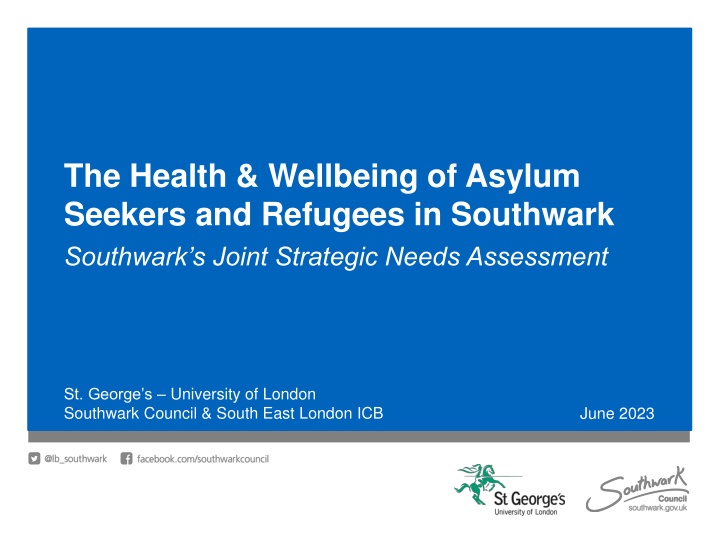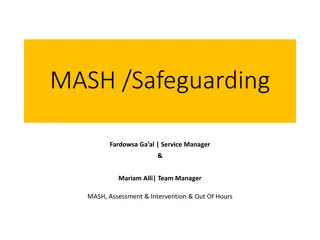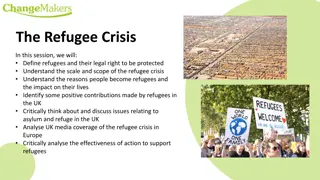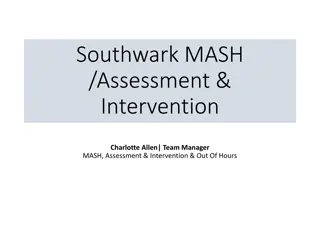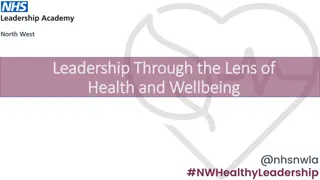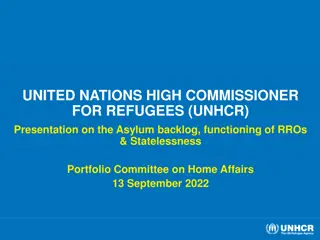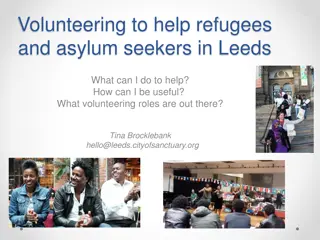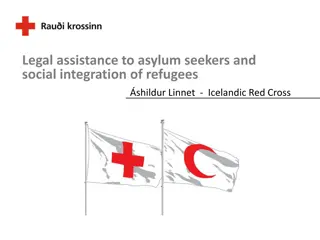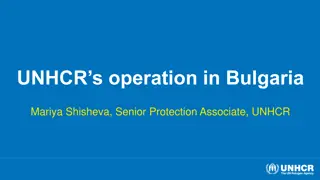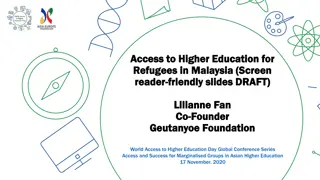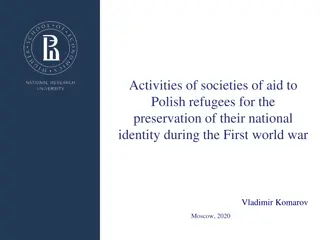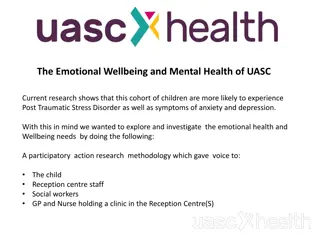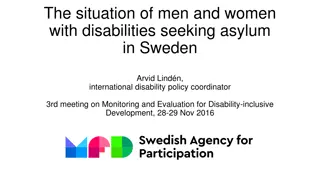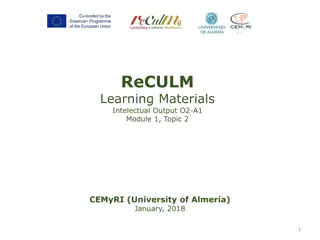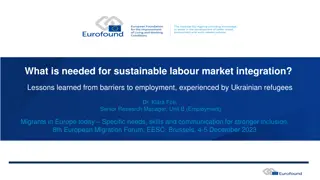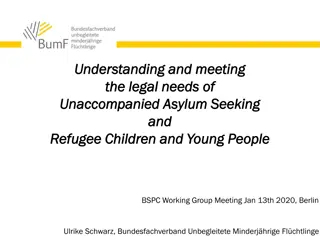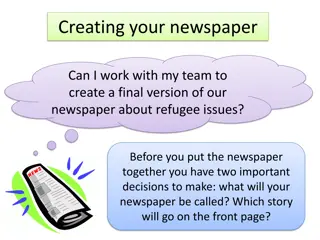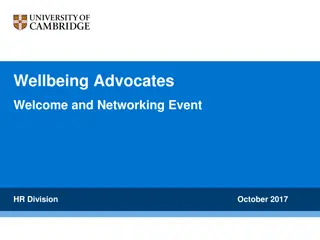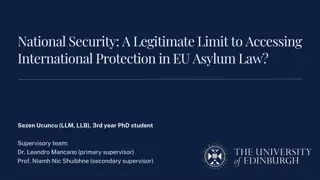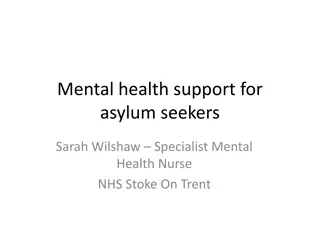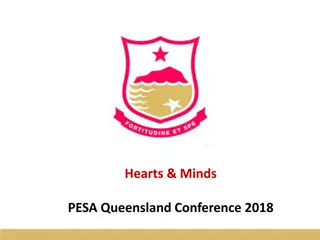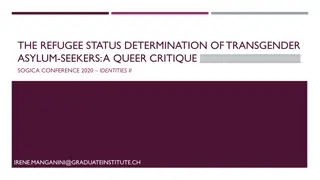The Health & Wellbeing of Asylum Seekers and Refugees in Southwark
This report focuses on identifying and addressing the health and wellbeing needs of asylum seekers, refugees, and migrants in Southwark. With a significant increase in the asylum-seeking population, the aim is to support these vulnerable groups and reduce health inequalities. Stakeholders from various organizations contributed to the report, highlighting the importance of providing appropriate healthcare services and support for those seeking sanctuary in Southwark.
Download Presentation

Please find below an Image/Link to download the presentation.
The content on the website is provided AS IS for your information and personal use only. It may not be sold, licensed, or shared on other websites without obtaining consent from the author.If you encounter any issues during the download, it is possible that the publisher has removed the file from their server.
You are allowed to download the files provided on this website for personal or commercial use, subject to the condition that they are used lawfully. All files are the property of their respective owners.
The content on the website is provided AS IS for your information and personal use only. It may not be sold, licensed, or shared on other websites without obtaining consent from the author.
E N D
Presentation Transcript
The Health & Wellbeing of Asylum Seekers and Refugees in Southwark Southwark s Joint Strategic Needs Assessment St. George s University of London Southwark Council & South East London ICB June 2023
GATEWAY INFORMATION Report title: The Health & Wellbeing of Asylum Seekers and Refugees in Southwark: Executive Summary. PUBLIC Migrant Health Research Group, St George s University of London: A Deal; S Hargreaves; K Lau M Zmroczek-Sterenberg; S Robinson Full report approved by S Leahy and S Douglass The health and wellbeing of asylum seekers and refugees in Southwark. Southwark s JSNA. Southwark Council: London. 2023. publichealth@southwark.gov.uk June 2023 Status: Prepared by: Contributors: Approved by: Suggested citation: Contact details: Date of publication: Slide 2
We commissioned this report to identify and support the health & wellbeing needs of our AS&R population AIMS & OBJECTIVES Southwark has a long history of welcoming asylum seekers, refugees and migrants from around the world, with growing numbers welcomed in recent years. Since 2019, the asylum seeking population in Southwark has increased from 100, to nearly 2000 as of September 2022. This is almost double the number hosted in Croydon, the London borough with the second most asylum seekers. Hundreds of Afghan and Ukrainian refugees have also sought sanctuary in Southwark in 2021 and 2022. Following the growth of the asylum seeking and refugee (AS&R) population, and the council s 2020 commitment to becoming a Borough of Sanctuary, this report was commissioned to identify the health and wellbeing needs of asylum seekers, refugees and migrants with irregular status living in Southwark. The growing size of the AS&R population, and limited research around irregular migrants, has meant that health services need new data and insights to commission services which genuinely meet the needs of local populations. As part of the Borough of Sanctuary commitment, it was also necessary to identify areas where health and wellbeing services and the local voluntary sector need further support to ensure Southwark is a place of safety and inclusion for people seeking sanctuary. Asylum seekers and refugees have been identified locally as a PLUS group experiencing health inequalities that will be supported under the NHS Core20PLUS5 programme for reducing health inequalities. Identifying health inequalities experienced by these populations will support the development of the local Core20PLUS5 programmes. Slide 3
Local residents, voluntary sector organisations, NHS & council partners contributed to this report METHODS 63 stakeholders from a range of organisations including the NHS, Southwark Council and the voluntary sector were interviewed for the project. Local, and in some cases national data, on demographics and health needs of asylum seekers, refugees and irregular migrants is limited, however quantitative data were gathered from the following sources: Statistics published by central government and the Greater London Authority on demographics and health & wellbeing needs of these populations. Data collected during the initial health assessments of asylum seekers living in local initial accommodation centres (IACs) by the Guy s and St Thomas Health Inclusion Team and Nexus Health. Data collected by Citizen s Advice Southwark and the Southwark Day Centre for Asylum Seekers. A total of two focus groups, three round table discussions and two community-based interviews were held between September and December 2022 In collaboration with United St Saviour s Charitable Trust, two roundtable discussions were hosted with 8 local voluntary sector organisations. A roundtable was also held with practitioners from the Southwark Council Family Early Help team. A focus group with local Eritrean, Iranian and women s groups was held in collaboration with Southwark Refugee Communities Forum. A focus group was held with IAC residents in collaboration with the Indoamerican Refugee and Migrant Organisation. Two 1-on-1 community interviews conducted with a Homes for Ukraine guest and an undocumented individual. Slide 4
Information on key AS&R populations in Southwark is outlined below, although data is patchy ASYLUM SEEKER, REFUGEE AND IRREGULAR MIGRANT POPULATIONS Population Local Demographics Legal status Healthcare access 984 in five IACS, including 259 children. Most aged 18-45, and male. Common countries of origin: Iran, Iraq, Eritrea Receive catered accommodation and 9.10 per week under section 95 or 98 of the Immigration Act. Unable to work or claim benefits. Accommodation is in hotel-style settings, widely judged to be poor quality by residents and professionals Free primary and secondary care. Registered with GP on arrival at IAC, and also supported by Health Inclusion Team (HIT). Asylum seekers in initial accommodation centres (IACs) Approx. 800. No local data on demographics of those in dispersal accommodation. As above, but in self-catered accommodation, with a 45 weekly payment. Free primary and secondary care, and access to HIT support at community venues. Asylum Seekers in Dispersal Accommodation 48 in Southwark, mostly aged 16-17. Common countries of origin: Iran, Afghanistan, Eritrea Similar legal status to other looked after children, with support provided post-18 to help with the transition. Supported to access healthcare by looked after children s service. Unaccompanied asylum seeking children 403 individuals from 233 households. 70% female, with an average age of 32. Hosted in local residents homes, with full access to benefits and employment. Access to healthcare in line with UK citizens. Homes for Ukraine guests GLA estimate 397,000 in London, with local figures unavailable. Anecdotal evidence suggests many with irregular status are Latin American or Nigerian. No recourse to public funds. At risk of immigration enforcement if reported to the Home Office. A small subsection of this group receive support from the council under the Care, Mental Health or Children s Act Free access to primary care, including A&E and sexual health, but charged for accessing secondary care. Those with irregular migration status
Asylum seekers have a range of complex health needs determined by their prior experiences and living situation HEALTH NEEDS OF ASYLUM SEEKERS IN IACS There are three key determinants of health for those living in initial accommodation centres (IACs), although they overlap with those experienced by other asylum seekers. 1. Health services and human rights in country of origin 2. Unsafe conditions on the journey to the UK and on arrival 3. Long stays in unsuitable circumstances in initial accommodation (18% of Southwark IAC residents have lived in IACs for over a year, with an average length of stay of 5 months) Child & maternal health Approx. 50% of children living in IACs required support from family early help team in 2022 Infectious disease 17% of Southwark IAC residents positive for latent TB infection Gender & sexual health Incidents of harassment of LGBT asylum seekers have been reported in Southwark IACs Food & nutrition Mental health 28% of residents tested at two IACs had folate deficiency, and 13% had iron deficiency 23% of referrals from IACs to our Family Early Help team were mental health related 16% of residents are of childbearing age and national evidence suggests IAC residents at higher risk of maternal death Sexual assault and gender-based violence are safeguarding issues in Southwark IACs IAC residents and health professionals complained of poor quality, culturally inappropriate food. At least 32% of IAC residents originate from countries with measles and polio vaccination coverage below the UK level 84% of residents in one Southwark IAC were diagnosed with mental health conditions including PTSD from torture (in 2014)
Other migrant groups in Southwark have similar health needs, although some are specific to their situation HEALTH NEEDS OF OTHER MIGRANT GROUPS Unaccompanied Asylum Seeking Children (UASC) 70% of UASC in Southwark identified in a 2020 audit had emotional or mental health needs (including substance misuse). This aligns with national research around UASC health, which identified high levels of mental ill health. National research has also identified issues with the post-18 transition for UASC, once they leave care. Guests on the Homes for Ukraine scheme Ukrainian guests have struggled to access work at a similar level to their jobs in Ukraine, and have struggled to navigate the benefits system. Ukrainian guests have specific health needs, including mental health needs related to the trauma of the Russian invasion, but also to the pre-existing public health situation in the country: TB prevalence is high, at 73 cases per 100,000 Immunisation coverage is very low (31% for measles and 56% for polio in 2016) 40 children on the scheme have been referred for support from Family Early Help for issues including social isolation and issues accessing public funds. Those with irregular migration status Low trust of healthcare services due to concern about immigration enforcement, or being asked to show ID when registering at a GP (in spite of universal entitlement to primary care) means that high levels of untreated chronic conditions such as diabetes and HIV are present among those with irregular status. Stress related to status also contributes to high levels of mental health need according to stakeholders. Those with irregular status are not eligible for social housing. Right to rent checks and low wages exclude them from most rented housing in Southwark. Many live in overcrowded, unsafe conditions.
AS&R and irregular migrants face significant barriers to accessing healthcare LOCAL SERVICES: ACCESS TO HEALTHCARE Barriers to accessing health care for asylum seekers, refugees and irregular migrants Language barriers make appointments difficult, and interpreter services are not always offered. Positive outcomes reported when HCPs speak same language. Many do not access services due to fears of being reported to the Home Office or being charged for treatment Lack of knowledge of the UK health system, including eligibility for free care, and access to dental care, is widespread Mental health services in IACs The Refugee Council, South London and Maudsley NHS Trust (SLAM) and HIT provide mental health care for the core IAC. Refugee Council commissioned to provide counselling in all IACs for a year from June 2022. SLAM have funded one advanced mental health practitioner specifically to support contingency IACS for a year from October 2022. Accessing healthcare in the IACs IAC residents are entitled to free primary and secondary care, and are all registered with a GP on arrival. IAC residents are offered an initial health assessment on arrival in Southwark, although in some settings this may be very delayed. IAC staff support residents accessing appointments, but some residents reported not always feeling supported. Safe Surgeries Safe Surgeries commit to not asking new patients for ID or immigration status. All Southwark GP surgeries have signed up to the scheme, but compliance has not been audited. Slide 8
AS&R and irregular migrant populations have unmet educational needs, with some variation by migration status WIDER DETERMINANTS: EDUCATION Common education needs for AS&R and irregular migrants Wellbeing Resources Language Schools report that many asylum seeker and refugee children need additional emotional support. SEND children may not get diagnoses due to cultural and language barriers. Schools can not usually provide free uniforms or stationery. Families in the asylum system have very limited funds, as do many irregular migrants in low paid work with no recourse to public funds. English as second language provision is far outstripped by demand locally and most education is only available in English. Specific educational needs for irregular migrants Stakeholders suggest some irregular migrants keep children out of school This is usually due to fears of schools sharing personal information with the Home Office. There are also challenges to enrolling children outside of school terms. Specific educational needs for IAC residents In Southwark IACs, evidence from stakeholders suggests that some children and families may struggle to access education Of 107 families who had contact with Family Early Help (and where primary contact issue was recorded), eight (7.5%) were referred due to not being registered in school. There is no systematic process to ensure IAC residents are registered with schools, with unregistered children opportunistically picked up by other statutory services. Once in school, IAC residents face specific challenges Families may be moved to another IAC elsewhere in the UK overnight, so may have to regularly move school. IAC meal times do not align with school timetables, e.g. breakfast may be after the children have to leave for school Slide 9
Migrants experience barriers to employment, food security issues and insufficient access to legal advice WIDER DETERMINANTS: EMPLOYMENT, FOOD SECURITY & LEGAL ADVICE Food Security Food provision in IACs is problematic, however, stakeholder interviews suggest that many AS&R and irregular migrants outside of IACs also struggle to afford accessible food. Many of these groups rely on food banks, providers of free meals or food pantries in Southwark, however evidence from stakeholder interviews suggests awareness of local options among the AS&R population is low. COVID-19 and the cost of living crisis have exacerbated this, particularly for those with NRPF Employment and Housing A steady income is essential for independence and avoiding destitution or homelessness, as well as having a strong effect on mental wellbeing Those in the asylum system cannot work so those who gain status have a significant gap in their work experience history and may struggle to find employment after gaining refugee status: the employment rate among former asylum seekers is 51%, compared with 73% those born in the UK. VCS groups in Southwark provide invaluable opportunities for AS&R to gain experience and skills that will enable them to gain employment when legally possible, but have limited resources. Housing is a key social determinant of health and wellbeing; providing a base from which families and individuals can access healthcare, employment, education and other services and is essential for both mental and physical well-being1 Housing is severely limited in Southwark, and many asylum seekers and refugees live in substandard accommodation or are forced to leave the area when they stop receiving state support. Immigration and Legal Advice Access to good quality immigration and legal advice is vital for AS&R and irregular migrants to ensure they remain in the UK, are able to access statutory services and are in safe and legal employment. Demand for immigration legal advice in Southwark and London currently dramatically outstrips supply, and need in Southwark is growing. Citizens Advice Southwark have seen a 25% increase in people with immigration problems seeking legal advice, and a 39% increase in immigration cases brought to it between 2020-21 and 2021-22. Slide 10
Social connectedness is vital to wellbeing; the voluntary sector is key to AS&R and migrant social life and support WIDER DETERMINANTS: SOCIAL CONNECTEDNESS Social connectedness and the voluntary sector in the IACs The VCS sector is the key provider of holistic community-based integration services , and are often considered as more approachable and trusted by AS&R communities compared to mainstream services Anecdotal evidence suggests that linking IAC residents to local community groups and social activities can have a strongly positive effect on mental wellbeing and integration, with positive outcomes seen regarding ability to find employment or gaining status. IAC residents and stakeholders emphasized the importance of the voluntary sector in promoting residents health and wellbeing, although IAC staff suggested they are not aware of relevant VCS groups or activities to signpost to. Finding iRMO [VCS group] was like a light in the darkness; I made friends who could speak my language and learnt English as well. Most importantly it has improved my confidence -contingency IAC resident, Southwark Social connectedness and the voluntary sector: AS&R and irregular migrants living in the community Community groups often serve as sign-posters to mainstream services such as healthcare, mental health support, legal and housing advice services for those who would otherwise not engage at all Day care centres and community groups are key to integration and wellbeing These are often focused on one community group, either by nationality or language, but could also have a wider scope (e.g. focus on asylum seekers, women and children etc) Many with irregular immigration status only feel comfortable presenting to community or other VCS groups, meaning they are essential for many communities Despite facing significant resource constraints, local VCS groups offer an important, holistic service to their communities: cultural familiarity, trust and association as well as practical advice and support across a range of social determinants of health and wellbeing Panjshir Aid worked closely with the council to support arrivals in the Afghan Bridging hotels (closed in December 2022) to register with GPs and schools; access information about COVID-19 and share information in Dari & Pashto. Southwark Day Centre for Asylum Seekers opens twice a week and offers services including a nurse from the Health Inclusion Team, free legal advice, free English lessons and free hot lunches, among many others. Slide 11
The report sets out recommendations for how partners can meet the needs of AS&R and irregular migrant populations SUMMARY OF RECOMMENDATIONS 1. Advocating for our residents 2. Improving access to health services 3. Building on the strength of the voluntary sector 4. Making data work for the benefit of asylum seekers and refugees a. Influence the Home Office to reduce length of stay in inadequate conditions in IACs, a key determinant of health & wellbeing issues for asylum seekers a. Evaluate the Safe Surgeries scheme to ensure residents are aware of it, and that health providers and staff are following best practice, providing training if needed a. Statutory partners should ensure VCS organisations working with migrants have sustainable funding and affordable premises a. Work with health providers to improve data collection for these populations, so needs can be more accurately identified b. Influence accommodation providers and the Home Office to improve food provision in local IACs at a minimum ensuring food is edible and nutritious. b. Healthcare providers should be trained to always offer interpreter services, and patients should be made aware of their right to an interpreter and to request translated documents b. Co-produce a translated welcome pack for all recent arrivals to highlight local services available, and ensure frontline staff are trained to use it b. Support local statutory services to share data, and should work regionally to ensure data is shared when asylum seekers are dispersed. c. Work with the Home Office to ensure robust measures in place to ensure all children in IACs are promptly registered in school, and that they share data with the council about any children not in school as a priority c. Support these populations to navigate the health system by funding more health navigators, in partnership with the VCS c. VCS groups should be supported to deliver more English classes, extracurricular activities for young people, and immigration legal advice c. Commission further research on the needs of those with NRPF, irregular status and living in dispersal accommodation. Slide 12
We are committed to taking forward the recommendations, in partnership with VCS organisations and residents NEXT STEPS The Southwark Borough Asylum Seeker Health & Wellbeing working group, comprising partners from across the NHS, the council and the accommodation providers, will be responsible for driving forward the health recommendations in this report. The working group will develop an action plan to improve the health and wellbeing of AS&R and those with irregular status, based on the findings of this report. The working group will liaise closely with the voluntary sector to co-produce this plan By the end of March 2024, the working group will produce an update for stakeholders, including asylum seekers, refugees and those with irregular status themselves, on progress against the recommendations in this report The wider recommendations, around education, legal advice and work to influence the wider asylum and immigration systems will be overseen by the Southwark Refugee and Asylum Seeker Multi-Agency Partnership, as part of the wider Borough of Sanctuary programme. The Multi-Agency Partnership includes all local stakeholders working with asylum seekers, refugees and those with irregular status in the borough, from across the council, NHS and voluntary sector, including grant funders. The Southwark Asylum Seeker Health & Wellbeing working group will regularly update the Multi- Agency partnership on it s action plan and progress towards implementing the recommendations of this report. Slide 13
Find out more at southwark.gov.uk/JSNA People & Health Intelligence Section Southwark Public Health
